Troubled Nato not in party mood for 70th birthday
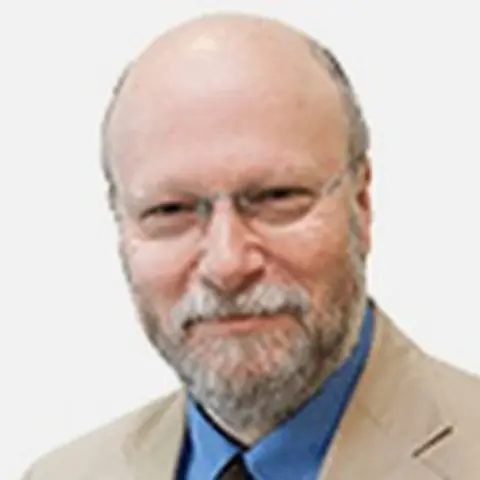
Seventy years of existence is clearly worth celebrating, but Nato is strangely low-key about this week's brief gathering of alliance heads of state and government outside London.
Nato spokesmen reject the label of "summit", insisting that this is really a lesser affair; that there was a full-scale summit only last year; and that this gathering will not release the traditional lengthy communiqué of conclusions and future plans.
Why so reticent? This is after all what many Nato advocates call, with some justification, the most successful military alliance in history.
Nato was founded in 1949 for the collective defence of its members, linking the security of the United States with its European allies against the Soviet Union. It witnessed the end of communism, defeating the Soviet bloc without firing a shot.
It went to war for the first time in the Balkans in the 1990s. It then set out on a new path - so-called "out of area" operations beyond Nato's frontiers, notably its operations in Afghanistan and the wider war against terror.
Nato also set about a programme of expansion, nearly doubling in size. Today it has 29 members and North Macedonia is soon to join its ranks.
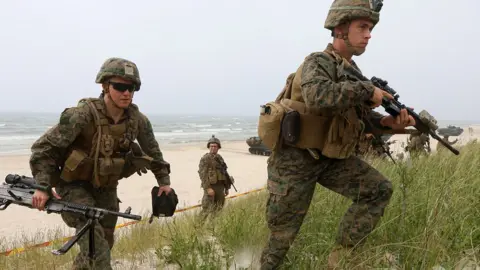 AFP
AFPNato - which is as much a diplomatic as a military alliance - has played a key role in stabilising the new democracies of Europe, whether it be in the Baltic or the Balkans, giving them a new self-confidence and locking them into a formidable security framework.
But has this actually produced a stronger Nato?
The respected British defence analyst Professor Michael Clarke says "no".
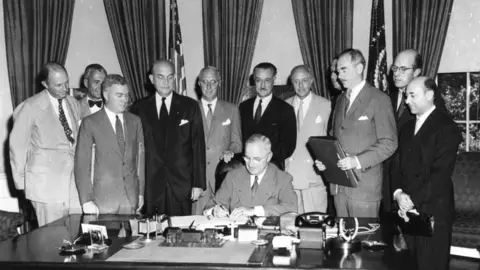 Getty Images
Getty Images"Nato is indeed the greatest alliance the world has ever seen," he told me, but "today with some thirty members, it is less than half as strong as it was when it was half this size.
"Nato is in trouble", he argues, "even though it's still got lots of capabilities".
Nato expansion is seen within the alliance as a good thing. Secretary General Jens Stoltenberg described it to me as a "historical success", the alliance helping to spread democracy and the rule of law.
A new Cold War?
Expansion has brought Nato's frontiers 1,000 miles (1,600km) closer to Moscow.
Countries once occupied by the Red Army and incorporated into the Soviet Union, like the three Baltic republics, or former Warsaw Pact allies of Moscow like Poland, are now firmly in Nato's orbit, and Russia's President Vladimir Putin does not like this.
Russia is pushing back in every way it can, bolstering its nuclear arsenal and seeking to renew its influence abroad. Its controversial but successful campaign to prop up the Assad regime in Syria is a case in point.
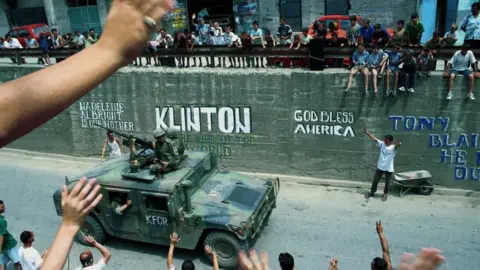 Getty Images
Getty ImagesIn Europe, Russia is criticised for cyber attacks; information operations to try to influence elections; even political assassination in the wake of a radiological and a chemical weapons attack - the former in London, the second in Salisbury in southern England.
The latter attack in Salisbury - which Moscow strenuously denies - prompted a mass expulsion of Russian diplomats and intelligence officers from Nato countries.
Many have spoken of a new Cold War. But this one is very different from that of the 1950s and 1960s.
Russia's power and influence is a shadow of that of the former Soviet Union's. This is a kind of shadow conflict waged below the threshold of combat, in what analysts call "the grey zone", where it is hard to assign blame for intrusive actions like cyber attacks or hacks against computers.
"There is a problem of political consensus in the western world and so we make it easy for Mr Putin," Mr Clarke says.
"Russia," he argues, "will be a real nuisance to Nato for the next ten or twenty years.
"But they should not be a strategically important challenge to us unless we let them."
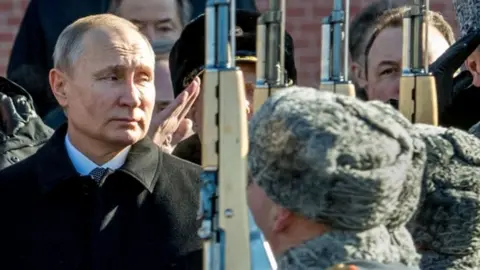 Getty Images
Getty ImagesRussia is simply using the intrinsic weaknesses of the West to further its own goals, he says.
"If the Western world and if the Western democracies are not sufficiently cohesive to deal with this threat - and at the moment I have to say they're not - then the Russians will actually play a big role in European security for the future.
They'll dominate the agenda. They'll constrain people's choices. They'll intimidate and they'll use a certain amount of not very subtle blackmail."
This Nato "summit" is all about demonstrating solidarity and resolve and also about charting a path for the future. But in the days leading up to the meeting there has been more than a hint of the problems behind Nato's ceremonial façade.

Nato has proudly announced new spending projections which show that the defence budgets of its European allies will grow further in the years ahead.
It has also agreed a new formula to spread the costs of Nato's central budget between its members; a budget that covers its headquarters in Brussels and other commonly funded programmes.
The US in this case will pay less and Germany, which lags behind in the proportion of its resources that it devotes to defence, will pay more.
It is all an effort to mollify President Donald Trump and to avoid another embarrassing tirade from him aimed at his Nato partners. The burden-sharing debate has long dogged Nato. Mr Trump did not invent it.
But he seems to take a peculiarly transactional approach to the alliance, and often does not seem to share a fundamental sense that the survival of a healthy Nato is as much in Washington's interests as it is in those of its European allies.
Nonetheless, Nato governments have committed to spending at least 2% of their GDP on defence; and many of them are still far from that benchmark.
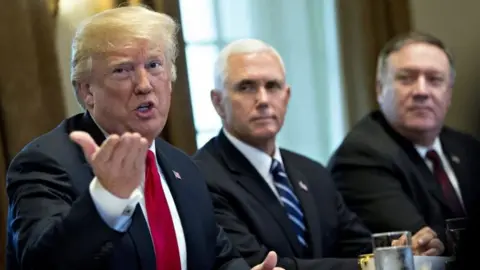 EPA
EPAStrategically 'brain-dead'?
But this focus on funding obscures other problems. Frustration is growing and this is what prompted the French President Emmanuel Macron recently to describe Nato as strategically "brain-dead".
Far from regretting his comments, he amplified them last week, insisting that the alliance needed to stop talking about money all the time and spend more time dealing with its fundamental strategic problems.
Only days before this week's summit, a row erupted between France and Turkey. It illustrates how events in north-eastern Syria are straining relations within Nato.
President Macron has repeatedly criticised both Washington's abrupt withdrawal of support for the Kurds and Turkey's related offensive into Syria - two strategic decisions that were taken without consulting other Nato allies.
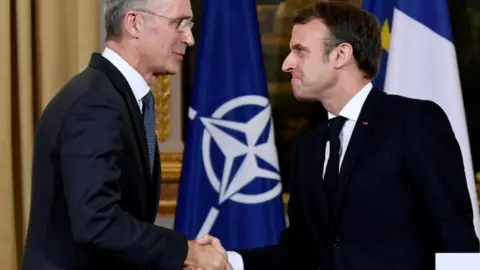 Reuters
ReutersTurkey sees France as far too friendly towards the Kurds. It wants Nato as a whole to back its position in Syria.
This episode underscores another fundamental problem for the alliance: what many see as Turkey's drift away from Nato and the West.
Ankara's purchase of a sophisticated Russian air defence system is an extraordinary step for a Nato ally.
The problem is that Turkey's size and geographical position make it an important, albeit for many troublesome, partner in Nato, despite some analysts questioning if it really should still be in the alliance at all.
A junction ahead?
So, Turkish and US unilateralism; rows over money; a resurgent but ill-defined Russian threat - there's plenty for Nato leaders to talk about when they meet in a luxury resort hotel near Watford, a town best known by many for its nondescript railway junction.
Nato too is at a kind of a junction itself. It has many of the problems of success. Many of the decisions it has taken - its expansion to bring in so many new members for example - were driven as much by politics as by strategy.
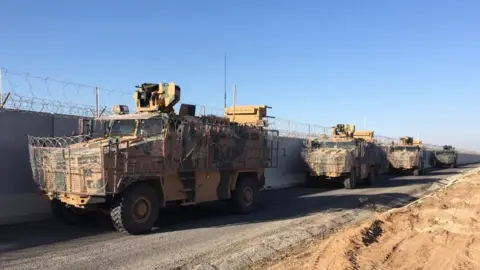 Getty Images
Getty ImagesBut the world has changed dramatically since Nato's founding. It is very different again from the world of the 1990s, in which Nato basked in its victory in the Cold War.
President Macron's label of "brain dead" may be going a bit far. But he has a point.
Nato leaders need to get back to strategy, to the big thoughts about where the alliance should be heading.
How will it contend with the Russian threat? Does it need to rethink its strategy? Should Nato have a common approach to a rising China? What should be Nato's priorities in the 21st-Century world?
